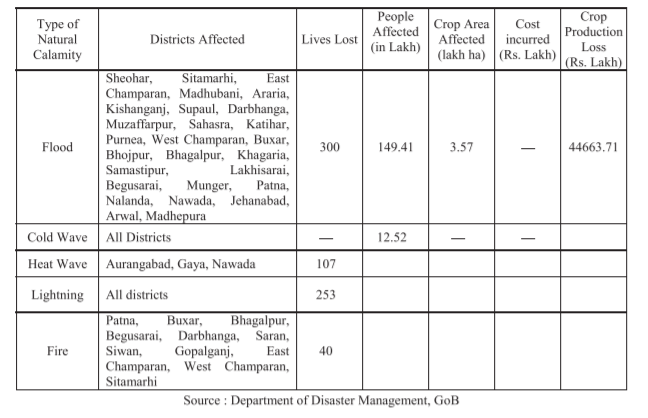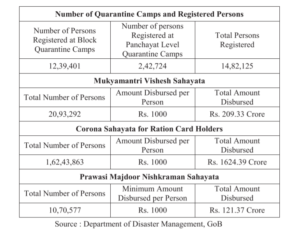Disaster Management
- Introduction:
- The Sustainable Development Goals of the United Nations not only emphasize on the need to protect and conserve natural resources of the environment, but also to sustain and develop the vulnerable communities through building resilience during calamities and disasters.
- The Roadmap for Disaster Risk Reduction (2015-2030) provides a set of guidelines for reduction of disasters and management of risks.
- The loss and damage to life and property during natural disasters for the year 2019-20:
- The damage to the state due to the floods was very high in 2019-20, amounting to a loss of damage to public property worth Rs. 16750 lakh. The damage to crop production due to flood incidents has been widespread in the state.
- Cold wave and lightning took toll on lives and property in all districts in 2019-20.
- In 2020, there were 459 reported cases of death due to thunderstorms in the state. The districts of Jamui, Aurangabad, Gaya, Rohtas, Banka, and Pumea, had more than 20 deaths each due to thunderstorms.
- The State Government lays high priority on efficient management of disasters in the state. The financial burden for management of disasters was substantially high in Bihar at Rs. 3539.49 crore in 2019-20.
- The highest expenditure came for the funds allocated for cash dole assistance at Rs. 2006.11 crore.
- The 15-year Disaster Risk Reduction Roadmap of Bihar envisages to follow a community-centric approach for disaster reduction in priority sectors, such as agriculture.
- Measures are being taken to revive the ponds and reservoirs in north Bihar and Ahar-Pynes in the southern part to enable water conservation measures to meet the flood and drought-like situations.
- The Disaster Management Cell is overseeing the measures for better preparedness of natural and man-made disasters in the state.
- Further, efforts are being made towards capacity building, strengthening the functioning of the District Disaster Management Authorities, organising public awareness campaigns, and investing more in the management of disasters in the state.
- Management of Covid-19 Pandemic in Bihar:
- Since the declaration of the Covid-19 pandemic as a public health emergency of international concern, the State Government has taken swift and stringent actions such as imposing a lockdown under the Disaster Management Act 2005 amidst other measures such as contact-tracing, testing, and home to home surveillance to minimize and curb the spread of the infection.
- The State Government invoked the Epidemic Diseases Act, 1897 and the Department of Health in Bihar issued the Bihar Epidemic Diseases Covid-19 Regulation, 2020.
- The past experiences of handling disasters served as a steady base for management of the health crisis caused by Covid-19 pandemic.
- The sudden huge entry of migrant workers from different parts of the country on May 3, 2020 led to spike in Covid-19 cases.
- The challenges to enforcing social distancing and hygiene protocols include
- high population density,
- sudden arrival of migrants,
- 33 percent of the state’s population are poor who have limited access to water, sanitation, and hygiene facilities.
- The State Government took measures for enhancing medical personnel and strengthen infrastructure and manpower for management of Covid-19. Various equipment like Intensive Care Unit (ICU) Beds, ventilators, ambulances oxygen cylinders, besides personal protection equipment (PPE), masks, gloves, testing centres, etc. were provided.
- Initiatives of the Department of Disaster Management
- The State Government resumed public works under the Saat Nishchay Programme, Jal Jeevan Hariyali Yojana, and MGNREGA.
- In terms of aiding the family of a person dying due to Covid-19, a sum of four lakh rupees were distributed.
- As part of the relief package:
- ration of one-month was freely distribution to all ration cardholders besides a one-time cash transfer of Rs. 1000 per family;
- payment of pension for three months in advance to all pensioners for old age persons, widows, and physically challenged persons.
- The work done by the Department of Disaster Management during nationwide lockdown in the wake of Covid-19 pandemic:
- Besides these initiatives, an amount of Rs. 465 crore was allocated by the Department of Health, Bihar for procurement of Covid-19 protection material during the Bihar Vidhan Sabha General Elections, 2020.
- The set of measures taken by the State Government in managing the Covid-19 pandemic in Bihar.
- Operation of Aapda Rahat Kendra (Disaster Relief Centers):- Disaster Relief Centres were opened since 27th March 2020 to provide food and shelter to the poor, homeless, destitute and other needy persons stranded in the urban areas of the state in the wake of nationwide lockdown imposed due to Covid-19.
- Social distancing norms were strictly implemented in these centers, which were functional till 2nd June 2020. More than 30 lakh persons were provided meals, free of cost, in these Disaster Relief Centers.
- Operation of Block Quarantine Camps : The Ministry of Home Affairs, Government of India allowed migrant labourers and other persons stranded in other states due to nationwide lockdown to return to their home states.
- On the request of the Government of Bihar, Shramiks Special trains were operated for transportation of migrant labourers to their native states.
- A large number of buses were deployed for the transportation of returning labourers to their respective block headquarters.
- Special inter-district trains were also operated for this purpose.
- Block Quarantine Camps were opened in each district where these migrant labourers and other persons of the respective blocks were kept in strict quarantine.
- They were provided food (morning breakfast, lunch, and dinner) free of cost.
- Social distancing norms were strictly implemented in the camps.
- Block Quarantine Camps were functional till June 15, 2020 and about 15 lakh persons were kept there.
- Operation of Seema Aapda Rahat Kendra (Border Disaster Relief Centers):
- After imposition of the nationwide lockdown due to Covid- 19, a large number of migrant labourers and other persons stranded outside the state of Bihar started returning to the state by buses and other means of transportation.
- Border Disaster Relief Centers were opened in all bordering districts of the State for these migrant labourers and other persons coming from various parts of the country.
- At these centers, all the labourers and other persons were screened medically and were served with food free of cost.
- The asymptomatic persons were sent to their respective districts by the concerned district administration.
- Social distancing norms were strictly implemented in these centers.
- Operation of Relief Centers in other parts of the country with the help of Bihar Foundation:
- Relief Centers were also opened in Delhi and some other states by the Government of Bihar with the help of Bihar foundation.
- The needy persons were provided food free of cost in these centers. In Delhi, the relief centers were opened at 13 different places. Apart from Delhi, these centers were also opened in Maharashtra, Goa, Telangana, Tamil Nadu, West Bengal, Karnataka, Sikkim and Gujarat.
- About 12 lakh people (No. of meals) took meal free of cost in these centers from March 28, 2020 to April 28, 2020.
- All arrangement were made from the Chief Minister Relief Fund.
- Corona Sahayata: In order to provide monetary assistance to the people of Bihar facing hardships due to lockdown, an amount of Rs. 1000 per Ration Card holder was paid as Corona Sahayata. The money was transferred directly in their bank account through DBT based on Public Financial Management System (PFMS). A total amount of Rs. 1624.39 crore has been paid to 1,62,43,863 ration card holders.
- Mukhyamantri Vishesh Sahayata: In order to reduce the hardships of the people of Bihar stranded in other states due to the lockdown, a monetary assistance of Rs. 1000 per person from Chief Minister Relief Fund was paid to them.
- The money was transferred directly in their bank account through DBT based on Public Financial Management System (PFMS).
- For the purpose of online registration/application, a mobile application was developed with the help of National Informatics Centre. More than 29 lakh people got themselves registered to avail this benefit.
- A total amount of Rs. 209.33 crore has been paid to 20,93,292 persons after scrutiny and verification of their applications.
- Pravashi Majdoor Nishkraman Sahayata:
- In the wake of nationwide lockdown because of Covid- 19 pandemic, migrant labourers were coming to Bihar in large number from other States by Shramik Special trains, buses, and other means of transport.
- The State Government decided to reimburse their ticket fare and other travel expenses subject to a minimum assistance of Rs. 1000/-.
- A total amount of Rs. 121.37 crore has been paid to 10,70,577 persons. The money was transferred directly in their bank account as DBT through Public Financial Management System (PFMS).
- Operation of Aapda Rahat Kendra (Disaster Relief Centers):- Disaster Relief Centres were opened since 27th March 2020 to provide food and shelter to the poor, homeless, destitute and other needy persons stranded in the urban areas of the state in the wake of nationwide lockdown imposed due to Covid-19.



